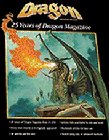



 |
Dictionary of Word Roots and Combining Forms by Donald J. Borror
Paperback, 134 pages |
I originally purchased this one in college to get me through my science courses, and have used it almost daily ever since. Find out what words like "Homonculous" really mean, and create technobabble on the fly. | |
| Encyclopedia Cthulhiana by Daniel Harms
Paperback, 423 pages |
 |
This book is an excellent guide to all aspects of horror relating to Cthulhu Mythos, including unlucky people, hideous creatures, dangerous texts to read, symbols that should be avoided, you get the idea. The Encyclopedia also contains a Cthulhu Timeline and a huge bibliography. | |
 |
Dragon Magazine Archive: 250 Issues of Dragon Magazine 5 CD-ROMs Published by TSR Hobbies Publication date: October 1999 |
I know, my "Ecology of the Wererat" article is in issue 251. *G* I was missing quite a few of the past issues and having a great deal of trouble locating the articles in the issues I did have. Remember, the early issues covered a lot of non-TSR games. This set was worth it for the Traveller articles alone! |
|
| Aliens and Alien Societies (Science Fiction Writing Series) by Stanley Schmidt, Ben Bova
Hardcover, 226 pages |
 |
Stanley Schmidt guides you toward a better understanding of our universe to create beings who will live in your science fiction. Aliens and Alien Societies explains science to help you make your fiction plausible. You'll avoid bringing characters from solar systems unlikely to support life. Discover the galaxy's vastness and imagine the technology needed to cross it. Put biochemistry on your side to put viable creatures on your pages. Learn how engineering shapes life and why this suggests that intelligent inhabitants of other planets might have similarities to humans. Develop well-founded cultures and logical languages. Introduce aliens to people or other aliens. Portray them as individuals, true to their species. | |
 |
Space Travel (Science Fiction Writing Series) by Ben Bova, Anthony R. Lewis, Tony Lewis
Paperback, 288 pages |
Space Travel explains science, to help you make your fiction plausible. You'll engineer your rockets with accurate technical data. Show your characters' physical responses to weightlessness. Know the environment of space, how inhospitable it is - and how it's opening for business. Build an Earth-orbiting habitat for your story's setting. Discover our solar system ... and the staggering immensity of interstellar space. Consider the prospect of near-lightspeed travel. Imagine the conflicts, legal and military, your fictional missions might spark. In this book, you'll see what is real today - and what may become real tomorrow. | |
| Time Travel (Science Fiction Writing Series) by Paul J. Nahin
Paperback, 208 pages |
 |
Time Travel explains science to help you make your fiction plausible. You'll leave for the future from a solid theoretical launching pad - and you'll see why the idea of traveling to the past violates no known laws of physics. Time Travel explores the theories of relativity, shows you the equations, probes the marvelous possibilities. It's filled with facts you can use in your fiction to cross the filmy borders and take readers along the corridors of time. | |
 |
World-Building (Science Fiction Writing Series) by Stephen L. Gillett, Ben Bova
Hardcover, 198 pages |
With Stephen Gillett's help, you'll be on solid ground, no matter what kinds of worlds you create for your science fiction. World-Building explains science to help you make your fiction plausible. You'll give your worlds the pull of gravity, aware of the effects on inhabitants and the planets themselves. Mix elements and build planets with chemically credible, geologically accurate characteristics - and anomalies - that affect those who live there. Create planetary "engines," convincing atmospheres and fact-based weather patterns. Colonize a truly weird world: ancient Earth. Explore our neighboring planets and their satellites for SF possibilities. Light and heat your landscapes with the right types of stars. See how things might be on a "chloroxygen" world and other hypothetical places. In this book, you'll follow calculations, read tables, view diagrams, learn what forces are at work in the universe, and see how you can harness them to give realism to the fantasy in your storytelling. | |